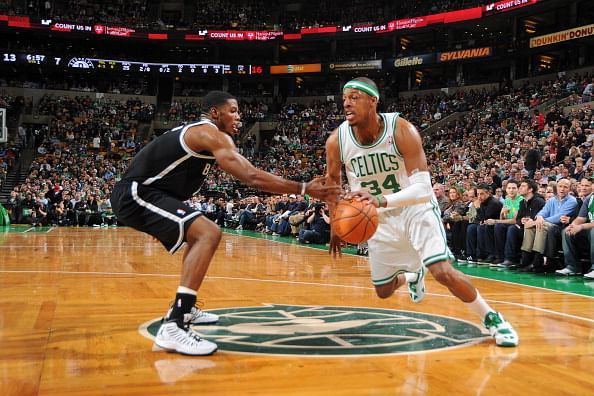
Paul Pierce: Boston’s Forever Truth
This isn’t breaking news anymore, but take a deep breath and picture the reality of the following sentence: Paul Pierce won’t be playing for the Boston Celtics next season.

Paul Pierce #34 of the Boston Celtics drives against Joe Johnson #7 of the Brooklyn Nets
It’s a business, they say, and business required Pierce, Kevin Garnett, Jason Terry, and DJ White to be traded to the Brooklyn Nets for Kris Humphries, Gerald Wallace, Kris Joseph, MarShon Brooks, Keith Bogans, and three future First Round picks. One team wanted to clear away their past and start afresh, and the other needed to add the necessary pieces to become a championship contender. It’s the nature of the business of the game that will see Pierce emerge in a Nets jersey next season. It’s the nature of the business that a player who symbolized everything about the new millennium Celtics won’t be a Celtic anymore.
And so ended the era of one of the league’s greatest and most loyal players of our time with the league’s most-storied franchise.
I’ve long had my eye on one very specific – but extremely important – list of NBA players. It’s the list of players to have spent their entire career (of minimum 10 years) with the same franchise. The career-long longevity signifies loyalty, both from the player and the team. It signifies the ability of the player to remain relevant and important to both the team and it’s fanbase for them to extend his stay amidst never-ending trade rumours, free agency, and the temptation of greener grass on the other side.
You could skip over quickly to Wikipedia to check on the surprisingly short number of NBA’s one-team guys such as John Stockton, Reggie Miller, and John Havlicek; but if you cut the list down to just players who are still active in the league, you’d be left with a chosen few legends, players who have forever become synonymous with the jersey they wear and the city they represent.
There’s Kobe Bryant (17 years with the Lakers), Tim Duncan (16 years with the Spurs), Dirk Nowitzki (15 years with the Mavericks), Tony Parker (12 years with the Spurs), Manu Ginobili (11 years with the Spurs), Dwyane Wade (10 years with the Heat) and surprisingly, Udonis Haslem (10 years with the Heat).
And until recently, that list also featured Paul Pierce, who had been a Boston Celtic for all of the 15 years of his professional career.

Boston Celtics’ Paul Pierce celebrates with his MVP trophy after winning Game 6 of the 2008 NBA Finals in Boston, Massachusetts, June 17, 2008. The Boston Celtics captured the National Basketball Association championship, routing the Los Angeles Lakers 131-92 to win the best-of-seven NBA Finals four games to two.
Paul Pierce journey into Celtics’ lore has been a roller coaster of highs and lows. When the Celtics picked him 10th in the 1998 draft, the storied franchise was welcoming the young swingman into a world where the past had been much brighter than the present. The Celtics had won a record 16 NBA titles at that point, but none of them since 1986, and had been stuck between mediocrity and awfulness since greats like Larry Bird, Kevin McHale and Robert Parish finally departed in the early 90s.
While the Celtics remained awful, Pierce made a good impression in his early years in Boston. But it was his bravery a year later that began the city’s true, long-lasting love affair with him. In September 2000, Paul Pierce was involved in a violent altercation, leaving him with 11 stab wounds across his body and requiring him to undergo lung surgery to repair the damage. Astonishingly, the youngster showed unbelievable heart and courage to bounce back by the time the season began and become the only Celtic to start all games in the 2000-01 season!
Armed with Antoine Walker by his side, Pierce became an All Star for the first time a year later and carried the Celtics to their best record in a decade. Pierce and Walker were the heart of the team that reached the Conference Finals only to lose to the Nets. For the next few years, they were stuck in basketball purgatory, being good enough to make the playoffs but never going past the Second Round. Pierce continued to amass All Star appearances.
He developed into one of the league’s elite scorers, leaders and clutch-performers. When he dropped 42 on the Lakers in 2001, Shaquille O’Neal nicknamed him ‘The Truth’. While he was always a step below the NBA idols of his time like Shaq, Duncan, Kobe, Iverson, and Garnett, he remained a constant thorn in their side, and kept the Celtics relevant and fun. He hit many big shots, orchestrated many big wins, and scored a lot of points.
The Celtics missed the playoffs in 2006 and 2007, with the latter being the worst year of Paul Pierce’s era with the team. Injuries limited Pierce to just 47 games that season and the Celtics stumbled to a 24-58 record which included an 18-game losing streak.
Suddenly, Pierce was touching 30, peering at the upcoming decline of his peak years in a team that offered no sense of optimism for the future.
And just as suddenly, everything changed.